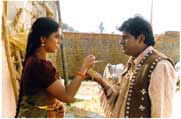|
|
Hagalu Vesha..... |
Baraguru Ramachandrappa is one of the most respectable writers in the
literary field. His analytical and introspective reactions to the occurences in history or
in present are honest and comes out of his total belief in the leftist ideology. He is
certainly a thinker and however you may disagree with him, you may have to lend your ears
to what he says. |
Baraguru Ramachandrappa has made forays into films earlier, but all his
earlier attempts were made with a shoe string budget and were branded as the arty stuff,
thus making those products unsuitable to the commercial world of films. But "Hagalu
Vesha" was advertised as a film which was born out of Baraguru's desire of reaching a
large segment of audience.
The producers of the film had spared no efforts to make a good and
commercially viable film. But all these efforts have gone in vain, and
|

|
|
what comes
out is an ordinary fair. The only saving grace is the rural based ethnic dialogues and
lyrics of Baraguru Ramachandrappa which stands apart from the run of the mill stuff. But
there is another itch here. Sometimes there is no coherence between the character and the
dialogues that he utters on the screen.
"Hagalu Vesha" is the story of a village based folk artist who is an
expert in performing an ethic folk art "Hagalu Vesha", which means he performs
different roles with different get ups to entertain the villagers. The story is set in the
pre-independence era. The hero of the film is Rama, who as a Hagalu Vesha artist
entertains the British officer who comes to his village. The British officer likes Rama's
histrionics, but refuses to heed to his request of collecting revenue tax. Slowly Rama
understands the difficulties fused by his fellow villagers and revolts against the
British. To this effect, he is ably supported by a teacher and his lover, who happens to
be the daughter of Village Patela. The climax shows how Rama and the villagers unite to
crush the British force and hoist the then Congress Flag, as a symbol of the aspirations
for the independence.
The first half is tolerable in the film, though the narration is slow. But the
second half is a real turn on. Shivaraj Kumar has tried to give justice to the role, but
he is hampered by the incoherent screen play Tara is good, but Reshma could have been
better. Krishne Gowda and Aravind are adequate.
If the film has any other good points other than the ethnic dialogues, it is
Hamsalekha's music and Rajan's Photography. Three songs are really catchy and one rendered
by Dr.Raj Kumar could have been better picturised.
|
|

